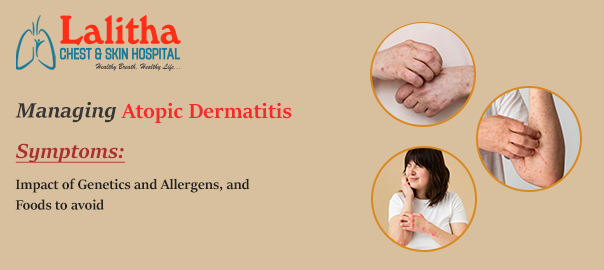Atopic dermatitis, or eczema, is a chronic skin condition characterized by inflamed, dry, and itchy skin with scaling. In severe cases, the skin may thicken and discolour, increasing the risk of skin infections.
The visible nature of this condition can lead to self-consciousness, negatively impacting self-esteem. Constant scratching may exacerbate health risks, making individuals more prone to allergic reactions, irritants, and infections.
“Atopic dermatitis can affect individuals of all ages, impacting specific areas like cheeks and scalp in babies, elbows and knees in kids, and eyelids, neck, hands, and feet in adults,” says the best skin specialist in Karimnagar Dr. Jyothi.
So, what exactly causes Atopic Dermatitis?
The precise cause of Atopic Dermatitis is unknown, making it an exciting and complicated skin condition. More often than not, this skin condition has multiple causes, including genetic, immune system, and environmental.
- Individuals with a family history of eczema are more prone to suffer from this skin condition. According to skin specialist Dr. B Jyothi, specific genes are prone to weaken the skin barrier, making it more susceptible to irritations, dryness, and infection.
- An overactive immune system may sometimes trigger chronic skin conditions like atopic dermatitis. In these cases, the body’s immune system mistakes harmless substances for threats and causes inflammation and reddish skin as a defensive reaction.
- Dry weather, allergens like pollen and pet dander, irritants like harsh chemicals, rough fabrics, and even excessive stress can also trigger this skin condition.
So a person can be susceptible to Eczema/ Atopic Dermatitis due to multiple reasons, experiencing symptoms such as dryness and itching, redness and inflammation, tiny bumps or blisters, thickened, leathery skin, fluid leakage from open sores, and sleep disturbances due to itchiness. These varied symptoms are commonly observed in patients at our Lalitha Chest and Skin Hospital in Karimnagar.
Managing Atopic Dermatitis: Foods to Avoid
Atopic dermatitis can be hugely uncomfortable, but it can be manageable to a certain extent with the proper steps. The first line of defence against atopic dermatitis is applying fragrance-free and hypoallergenic moisturizers to keep the skin hydrated. Lukewarm baths with gentle, fragrance-free products are recommended to avoid over-drying the skin.
Managing stress, getting enough sleep, and choosing a healthy diet can help alleviate symptoms. Patients are advised to avoid certain foods that may exacerbate symptoms, such as dairy, eggs, excessively spicy foods, processed foods, refined sugar, and nuts and soy in some cases. While these food allergens vary from person to person, seeking medical consultation is always advisable before making drastic dietary changes.
In most cases, managing atopic dermatitis proves to be challenging. In these situations, seeking professional medical help as soon as possible is always recommended.
Atopic Dermatitis Treatment in Karimnagar:
The treatment for atopic dermatitis usually involves topical medications, immune suppressants, light therapy, and lifestyle modifications. At Lalitha Chest and Skin Hospital in Karimnagar, we evaluate the severity, identify the possible cause of the skin condition, and tailor the treatment based on the specific individual to ensure effective results. If you are in and around the Karimnagar area looking for eczema or atopic dermatitis treatment, you can contact us here.


